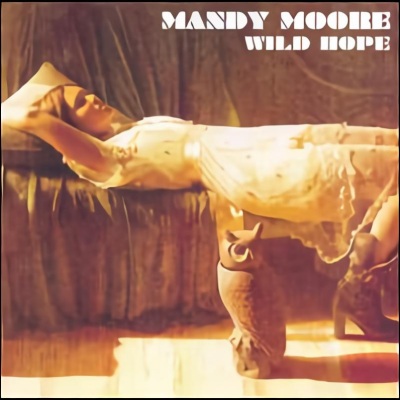
Wild Hope
by Stephen Thomas ErlewineSince Mandy Moore lacked the hits and sharply defined persona of her immediate teen pop peers, she had the freedom to redefine her image in a way Britney or Jessica didn't. She could ease into adulthood while her onetime colleagues were stuck in a perpetual adolescence, falling out of cars and clothes (often simultaneously), slowly turning into pop culture punch lines instead of pop stars. Moore side-stepped such embarrassment by focusing on work, both as a musician and actress, picking projects that looked so great on paper that it almost didn't matter that the end results never quite lived up to their potential. This was as true for the 2006 silver screen American Idol satire American Dreamz as it was for her 2003 album Coverage, an attempt at covering great pop songwriters that proved Moore's taste, ambition, and smarts. Even if it wasn't necessarily compelling listening, it did provide a template for a mature Mandy Moore and Wild Hope, delivered four years later -- after a parting of ways from Epic, then an unsuccessful stint at Warner that resulted in no albums but led to a contract with EMI -- follows through on much of its promise. In most ways, Wild Hope is Coverage assembled with original tunes: it's a classy, burnished collection of adult pop, often built on acoustics but rarely seeming folky, because it places the emphasis on melody, like most pop music. Where that covers album occasionally seemed a little too earnest and stiff, Moore has corrected most of those flaws: her singing is warm, even soulful, while the music sounds lived-in, not overthought. So, Wild Hope has the right sound, which Coverage didn't quite, but it ironically falters where that album went right: the songs aren't that memorable. It's certainly not for lack of trying: Moore has enlisted such respected singer/songwriters as Chantal Kreviazuk, Lori McKenna, and Rachael Yamagata as collaborators, helping her inch toward confessional, introspective songwriting, an admirable ambition that falls short of being easy to embrace. There are some good turns of phrase here, some ingratiating melodies, but there aren't strong melodies, so the tunes aren't memorable outside of their gentle, comfortable feel. All the same, it's sure hard to dislike Wild Hope, because it's genuine in its intent -- Moore truly wants to deliver a record that sounds her age, in its feel and words -- and because Mandy is such an appealing, open-hearted, undeniably attractive presence. Whether onscreen or on record, she exudes likeability, so it's easy to listen to Wild Hope with all its flaws -- but it's just good enough that it's hard not to wish it were better.
